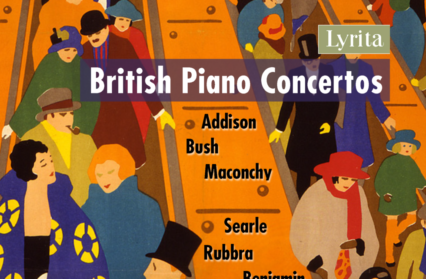David Truslove takes a look at British Piano Concertos, the latest release by Lyrita featuring six piano concertos, conducted by Martyn Brabbins, performed by Simon Callaghan and BBC NOW.
The BBC National Orchestra of Wales deserves only praise for this recent compilation of rarities where five of the six performances of British piano concertos are first recordings. High praise too for the initiative of Lyrita – arguably the most enterprising of UK record labels. By the time you’ve looked twice at the front cover you may have registered a train spotter’s delight at seeing the composers’ names. How often do we encounter the likes of John Addison, Arthur Benjamin, Elizabeth Maconchy, Humphrey Searle, Edmund Rubbra and Geoffrey Bush outside the recording studio?
The listing may prompt the compilation of your own directory of British piano concertos ranging from Britten to Tippett via Ireland’s once popular work. Further afield you might recall the piano concertos of Lennox Berkeley and Hoddinott and Mathias amongst the most prominent contributors to the medium in Wales. But how many of these works ever secure performances in the concert hall? Of Lyrita’s collection of 13 piano concertos issued in 2014, only Finzi’s one movement Eclogue has secured a foothold in the repertoire. Most, if not all of the works on this recent disc have fallen by the wayside, and maybe that’s because with titles including the words ‘Concertino’ and ‘Concertante’ they are not actually fully blown piano concertos. Does this reduce their status and increase their neglect? Perhaps the question to ask is how can a composer sustain their output? Must there be emotional substance and virtuosity to sustain the life of a concerto? If we go by box office thinking only the big romantic utterances from central Europe and Russia have any enduring appeal.
So will this disc merely place these works within an archive for future generations and be listened to for purposes of study? I can’t imagine John Addison’s ‘Wellington Suite’ having much of a performance life beyond an occasional exhumation at the Berkshire college for which it was written in 1959. As an amuse-bouche it fulfils its role admirably, so it’s best not to look further than high spirits and a salon-like character, of which both are achieved with a polished urbanity. Modestly scored for two horns, piano, timpani, percussion and strings, the work gives players plenty to do, and may yet have a place outside more accomplished school orchestras. Its puckish last movement is a delight.
Arthur Benjamin’s ‘Concertino for Piano and Orchestra’ (1927) is a more rewarding affair with a dash of Broadway style and jazz combining to colour a shapely work in four connected movements. A trumpet solo sets in motion the opening ‘Allegro’, a fanfare motif soon taken up by piano and horn to become the movement’s backbone. Woodwind solos (including an alto saxophone) hold the ear in the Bluesy ‘Lento’, athletic piano writing dominates the third movement (with echoes of Gershwin’s Paul Whiteman collaborations), while the fourth brings reminiscences of earlier material. Martyn Brabbins directs the BBC NOW with his customary aplomb, never losing sight of internal balance and judging tempo changes to perfection.
More serious territory occupies the next two works: firstly, Elizabeth Maconchy’s gritty ‘Concertino for Piano and Strings’ of 1949 reveals a strong musical personality. If the expressive slow movement bears kinship with the intensity of Bartók’s ‘night’ music, the outer movements are similarly indebted to the central European mainstream, and both exhibit a mastery of the medium in their sureness of touch and lyrical impulse. No less individual is the music of Humphrey Searle whose ‘Concertante for Piano, Percussion and Strings’ (1954) is based on serial techniques. It’s an eventful and energetic four minutes that repays attentive listening, not least for its expressive variety, alternating sonorities and centrally-placed mini cadenza.
Where Berg and Webern might have been conscious models for the Searle work, it was Holst who exerted an influence over Rubbra’s ‘Nature’s Song’, a student work from 1920 when he was studying at the Royal College of Music. Labelled a tone poem and scored for orchestra, organ and pianoforte, this reconstructed work (courtesy of Simon Callahan) alternately clenches and relaxes, its contrasting moods deftly integrated into a fledgling work but one yet to presage the depth of his later achievements. Curious not to hear the organ part – unless it’s optional.
The disc closes with Geoffrey Bush’s pleasantly anodyne ‘A Little Concerto on themes of Thomas Arne for Pianoforte and Strings’. Reworking three keyboard pieces by Arne (best known for ‘Rule Britannia’), the resulting score is a model of taste and classical balance. This neo-classical dessert concludes a well-chosen menu of British works in which soloist Simon Callaghan and Martyn Brabbins are persuasive advocates. BBC NOW has added another fine example of polished playing to its discography.
Martyn Brabbins (conductor) | Simon Callaghan (piano)
John Addison – Wellington Suite
Arthur Benjamin – Concertino for Piano and Orchestra
Elizabeth Maconchy – Concertino for Piano and String Orchestra
Humphrey Searle – Concertante for Piano, Percussion and Strings, Op. 24
Edmund Rubbra – Nature’s Song
Geoffrey Bush – A Little Concerto on themes of Thomas Arne for Pianoforte and Strings
Simon Callaghan Lyrita Lyrita Lyrita











